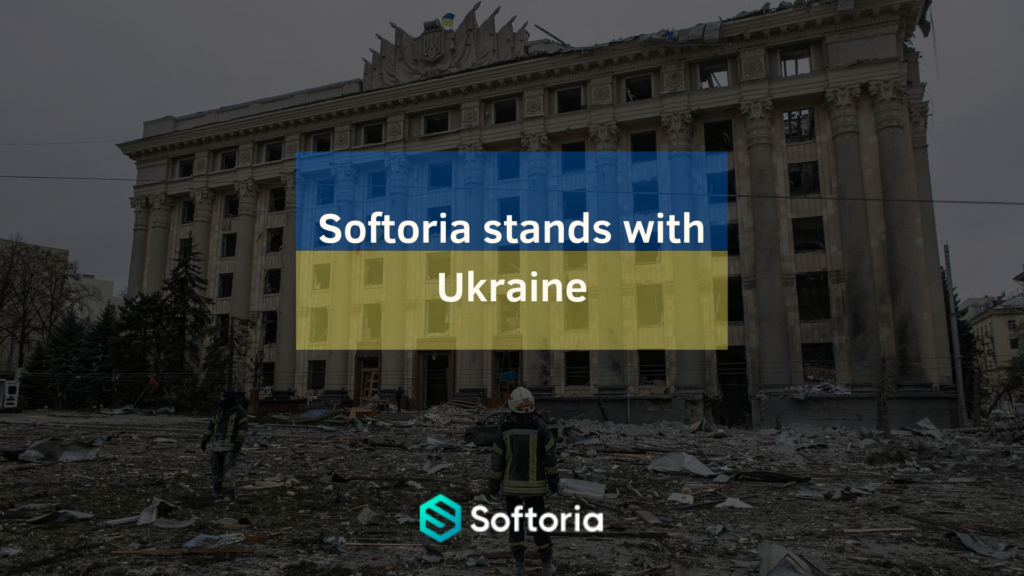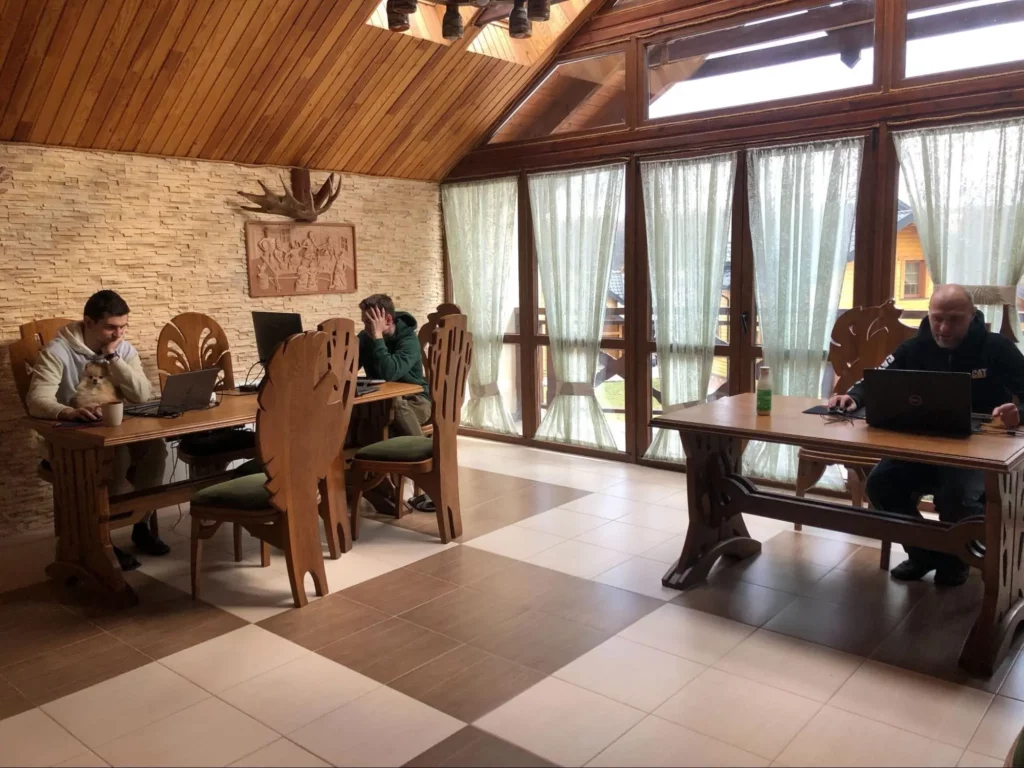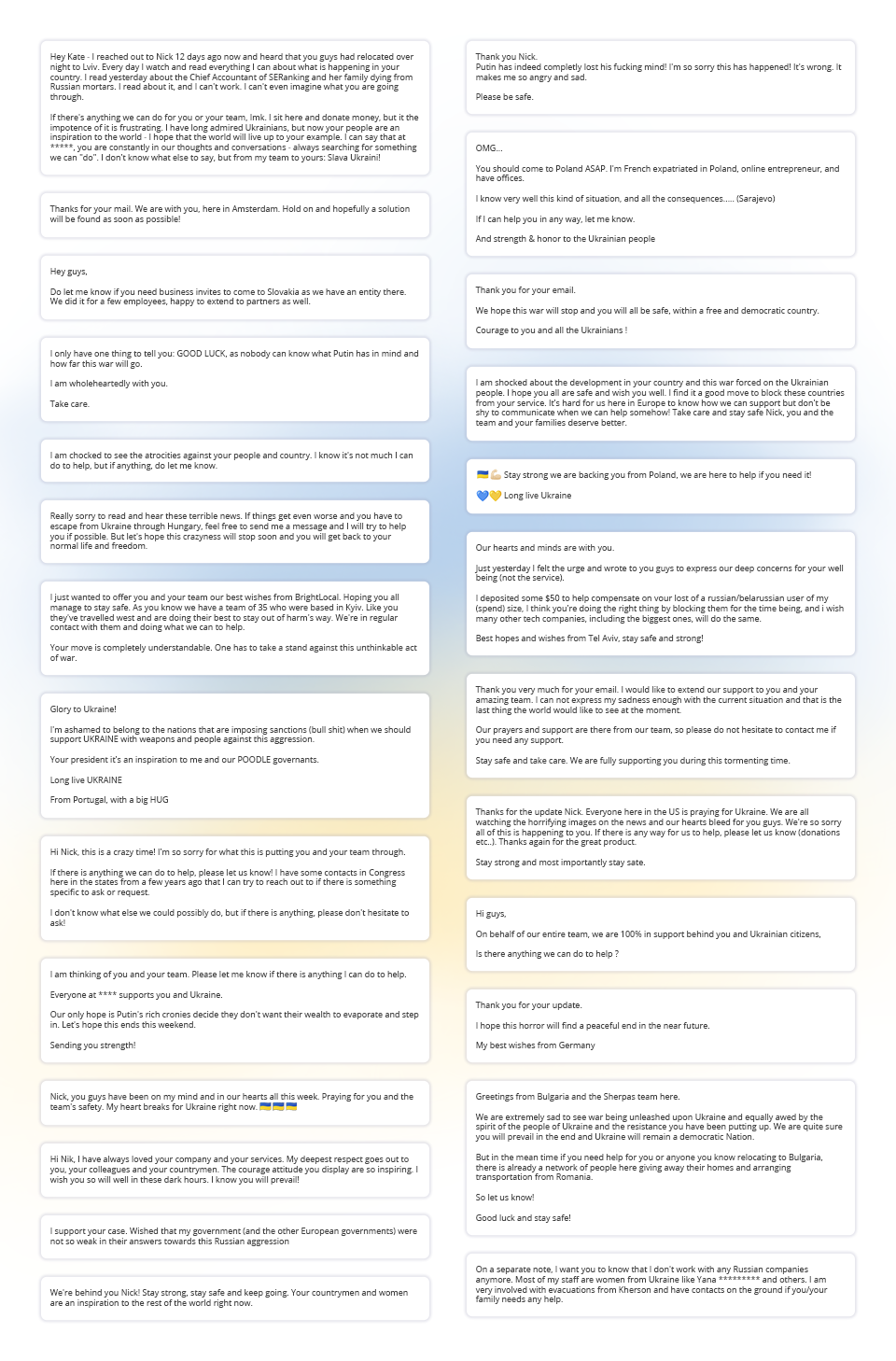- softoria_admin
- September 02, 2022
Softoria and war: how it affects our work and what we do to help Ukraine win

War isn’t something you expect, no matter what happens around. Even knowing that Russia had amassed hundreds of thousands of troops near Ukraine’s borders, none of us really believed the invasion could ever take place.
Just imagine it. On February 23, we were celebrating a colleague’s birthday in our office in Kharkiv, eating pizza and having fun. And on the very next day, we had to experience what it was like to wake up to the earsplitting sounds of shelling and missile strikes.
The war had come to our door and caught us completely off guard.
Kharkiv was bombarded heavily in the first months, and it was obvious we would have to say goodbyes to our cozy office. Just like that, we switched to remote working mode.
How we manage work during the war
For some time, most of our team remained in Kharkiv. Thanks to our designer Victoria, who picked up our laptops from the office and delivered them to each teammate on the first day of the war, we were able to continue our work in the safety of our homes.
Having lived through countless COVID-19 lockdowns, we knew very well how to manage tasks remotely. But COVID-19 was an entirely different situation compared to the full-scale war.
We soon realized that working on our day-to-day tasks under constant bombarding wasn’t the best option. We were forced to spend a good portion of time hiding in cellars, basements, and bomb shelters with no internet, so productive work was out of the question.
That’s why the majority of the Softoria team eventually left Kharkiv. In a month or so, most of us had moved to safer places.
Some relocated to Western Ukraine, which was (and still is) the most peaceful part of the country. And a few even fled Ukraine, finding shelter in Poland, Finland, Bulgaria, and other European countries.

Three members of our dev team focused on work, somewhere in Western Ukraine.
To this day, most of us continue to work remotely. And now our work is completely different from the one it used to be before.
Admittedly, some processes have slowed down. There are at least three culprits to blame for it.
The first one is the lack of personal communication. Instead of discussing work matters with colleagues in person as we used to, we now have to chat in a corporate messenger. So when we face problems, working on solutions now requires endless discussions in Slack threads, which increases the total time we spend on fixing bugs or introducing improvements.
The second culprit is the stress from the war. In the first days, we were so overwhelmed with the constant flow of bad news that some of us became numb and couldn’t focus on work. Telegram news channels were publishing posts literally every minute (sometimes several posts per minute!), and a lot of us found ourselves doomscrolling. The future seemed uncertain and coping with job responsibilities became unbearable.
To be fair, however, we should note that a lot of our developers, on the contrary, began to work even harder as a way of relieving stress. That’s why we’ve managed to release so many new amazing products and features despite the war.
The third culprit is the fact that some of our teammates still remain in the frontline areas and can’t be always available. Our company treats it with complete understanding and doesn’t expect anyone to work eight hours a day when their life is in danger.
With that being said, you might think that remote work has only made things worse for us. But that’s not true — there are still many advantages to it.
First of all, now we have plenty of time to generate new ideas. In Kharkiv, we had many distractions that we spent our time on. Having left them behind, we often feel bored in our free time. It turns out boredom is a good driver of progress, as we regularly come up with ideas for new products and features.
It’s also worth noting that when you work remotely, it’s easier to maintain a healthier work-life balance. Back in the office days, we had to spend about 30 minutes getting to the office, and the same amount of time getting home. Now you can wake up and start your shift right away. Thus, you finish your work an hour earlier than before and can go for a walk or indulge in any other activity.
And last but not least, we now hire professionals from all over Ukraine. When we worked from the office, we mostly preferred candidates from Kharkiv as they could visit the office and work hand in hand with our team. Given that it is now closed, we have stopped focusing on the geographical location of our candidates. Now we are happy to have plenty of professionals from different parts of the country who have become an integral part of our team!
Our empathetic customers
Even though we are scattered across cities and countries, without the privilege of seeing each other and communicating in person, we still work hard and never grieve.
That’s thanks to our valued customers who lift our spirits.
Since the very beginning of the war, we have received lots of support from our clients all over the world. A lot of them have reached out to us, asking how the war is affecting us and offering help. Why, some even invited us to live in their countries!
Besides taking care of our customers, we also do everything it takes to help our country win.
How we contribute to the victory of Ukraine

The war has been going on for over half a year now. Each day our soldiers and civilians die at the hands of terrorists who call themselves Russians. Our apartments are being destroyed, our land is being burned, and our air is being poisoned.
If we leave things as they are now, Ukraine will surely cease to exist.
As a Ukraine-based IT company, we can’t turn a blind eye to what’s happening in our country, and we do everything we can to contribute to the victory of Ukraine.
We deliver fuel to volunteers that evacuate people from the frontline areas. We provide humanitarian aid to Kharkiv and financially assist our teammates with relocation. We regularly supply protective equipment, drones, and medical kits to our soldiers on the frontline. Besides, we also provide special equipment along with financial aid to the State Emergency Service.
Overall, we donate 50% of our income to help Ukraine win! And that’s without taking into account personal donations from our teammates.
We know that the war might take years to come to an end, but we won’t stop donating until we hear on the news that Ukraine has finally won.
Our plans for the future
Some might consider planning for the future reckless, given that you could die while shopping for groceries or walking your dog.
But hey, does it mean we should stop everything we do and meekly wait for our death to come? Of course not!
Our country needs us more than ever, and to continue helping it, we must keep our company fully operating.
From the very beginning of the war, we haven’t stopped working even for a day, as we understand how important it is to generate income and be able to donate to our army. We plan to do everything it takes to bring the victory of Ukraine closer, despite the risk we put ourselves in. If you also feel this way and would like to help Ukraine win, visit this page and read how you can do it.
To continue our efforts, we recently rented an office in Kyiv.

But most of us still work remotely.
Summing up everything said in this blog post, we want to note that no matter how difficult the current situation is, we still successfully operate our company:
- Our team is working both from the office and remotely;
- We continue to donate 50% of our profits to various charity organizations;
- We’re slowly scaling our companies and coming up with new projects;
- We’re successfully hiring motivated professionals all over Ukraine;
- We believe in our army and the victory of our country.
Want to join us and become part of our friendly team? Contact us and find out about available job vacancies. Apply online by filling out a simple form and don’t forget to attach your resume — our HR will contact you shortly.









